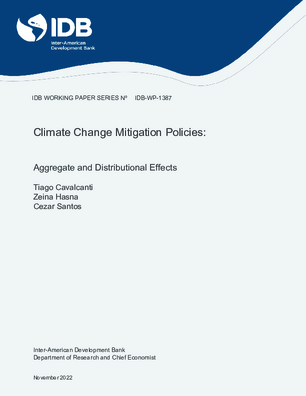Climate Change Mitigation Policies: Aggregate and Distributional Effects
Date
Nov 2022
Summary
We evaluate the aggregate and distributional effects of climate change mitigation policies using a multi-sector equilibrium model with intersectoral input-output linkages and worker heterogeneity calibrated to different countries. The introduction of carbon taxes leads to changes in relative prices and inputs reallocation, including labor. For the United States, reaching its original Paris Agreement pledge would imply at most a 0.8% drop in output. This impact is distributed asymmetrically across sectors and individuals. Workers with a comparative advantage in dirty energy sectors who do not reallocate suffer a welfare loss at least six times larger than workers in other sectors, but constitute less than 2% of the US labor force.




